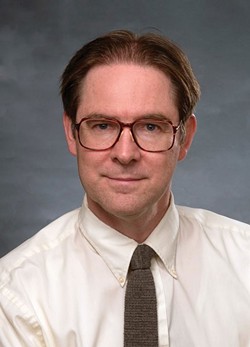Running Toward the Right
A new Utah Democratic group hopes to recruit more conservative rural candidates.
By Eric Ethington @ericethingtonA new organization believes it has a winning strategy for rural Democrats in Utah: Lean to the right. The recently formed Utah Centrist Democratic Council aims to recruit candidates that promote a more conservative fiscal and social outlook to, as the council's website says, "restore the Democratic Party as a viable Utah political party." Although not officially associated with the Utah Democratic Party, UCDC is raising money and recruiting candidates with more conservative ideologies than their Salt Lake County counterparts to run in rural Utah.
"We want to show that Democrats are mainstream," says Richard Davis, a BYU professor of political science and former Utah County Democratic Party chairman who co-founded the group along with Rep. Brad King, D-Price, as well as former House Minority Leader Scott Howell and others. "We believe in problem solving, and we want to show a different image than the party has with most voters in Utah."
According to Davis, Democrats don't win outside of Salt Lake County often because rural voters don't like the party's stance on so-called social issues. "I think if you ask voters what they think Democrats stand for, they'll say, '[Democrats] stand for abortion and they stand for gay marriage,'" says Davis. "What we want to tell these voters is that we're in sync with [them], and we're more socially and fiscally moderate to conservative," he says.
Being perceived as pragmatic problem solvers is key, Davis says, and he thinks that UCDC-aligned candidates need to portray a willingness to find common-ground solutions on issues such as the contentious push for states to take over and potentially privatize public lands.
Utah Democratic Party executive director Lauren Littlefield says the party doesn't take issue with candidates whose stands differ from the party platform. "We're never going to be the party who says, 'You have to say this if you want to be one of us,'" says Littlefield. "I feel like they're just another tool in the toolbox to help Democrats get elected."
While Littlefield acknowledges that Davis "can talk to people that I can't," she also says she doesn't believe that running to the right on social issues is going to win over voters. "We've seen some data on some of these social issues outside of Salt Lake County," says Littlefield, "and while some people in this state may be grappling with their religious beliefs [over marriage equality], it's the law of the land, it's happened, and I think the less candidates talk about it the better."
Regardless, Littlefield says, her organization has only one goal: to elect more Democrats. "So, if it works better in Utah County to have more conservative Democrats on the ballot, that's great," she says. "If it works in the Avenues to have a super-liberal candidate like [state Sen. Jim] Dabakis, that's great too."
Not everyone's convinced that Utah Democrats can become more electable by shifting farther to the right, especially since Utah Democrats are already considered far more moderate than Democrats nationally. Longtime Cache County-based political strategist Jason Williams cautions that Democrats who create less distinction between themselves and Republicans may not only fail to attract GOP voters, but will discourage Democrats from turning out to vote. "There's nothing new about this idea, Williams says, "and [going to the right] has watered down many Democratic candidates over the years, who then lost their campaigns."
Williams points to former Democratic gubernatorial candidate Peter Cooke, who ran against Gov. Gary Herbert in 2012. Cooke, he says, lost support from his party's own voters when, on Davis' advice, he held a press conference announcing opposition to same-sex marriage and reproductive rights. "If Democrats going this route can't even get their own base excited and turned out to vote, what's the point of trying to get Republican voters to flip for you?" Williams asked. "Davis has tried this before, when he was chair of the Utah County Democratic Party, and none of those candidates ever won a general election."
Davis doesn't agree that Cooke's campaign lost because of Cooke's more conservative positions. The campaign was already on the ropes, he said, because it was hugely underfunded compared to Gov. Herbert's campaign.
If Democrats want to win more seats, Williams says, they should start looking to the example of Montana Democrats, "who faced a similar cultural conservatism," but focused on getting their own base out to vote as well as attracting new voters.
"They got Brian Schweitzer elected," says Williams, "who became one of the most popular governors in decades. And they did it by adopting stances on contentious issues that didn't turn off Democratic voters and, at the same time, opened the doors for unaffiliated and independent voters."
More by Eric Ethington
-
The Challengers
Two Democrats square off to take on Sen. Mike Lee
- May 4, 2016
-
Prison 'Skype' Replaces Visitation
Uintah County Jail enforces new video-chat program.
- Apr 27, 2016
-
Boat Rockers
Democratic Party struggles to bridge gap between Sanders supporters and the establishment.
- Apr 13, 2016
- More »





